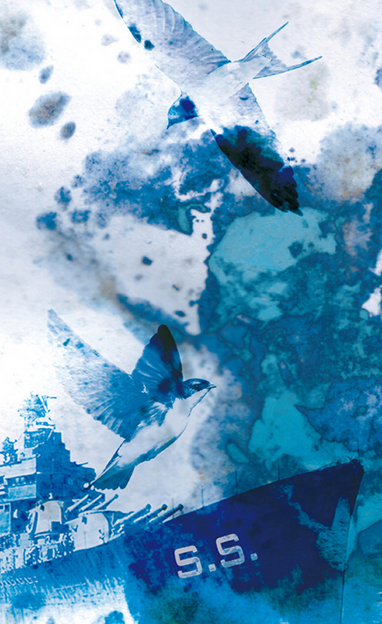

S sailed on her ship from the land of sparrows. S sailed on her ship from the land of swallows. S, a spouse and mother, sadly parted from her husband and child for this deployment. S, a solitary woman, left her distant siblings with sweet abandon. They were both about to serve overseas. Their ships sailed toward the shores of war, where their countries combined their forces, depositing troops on the same beaches.
Though the two women could not have been more different (S was homesick, S unbound), both were scared. The smoke of danger slithered beneath their respective cubicle doors. Neither was new to combat. Sheer experience stirred their fear. The struggle for each was to control an alarm inside, a wakened panic that took the shape of insomnia.
As it happened both came up with the same solution. They angled for nighttime guard duty on shore, where small boats secretly brought rebels to hide in the caves among the shoreline boulders. Thus it was at low tide in the pitch dark and cold that they met for the first time.
In tandem they were to patrol, armed, in buggies with searchlights. But, where the buggies couldn’t roll, S and S had to go on foot in the night. S was stocky; S was slight but strong. Both about the same height, the two found it easy to assist each other as they slid, in full gear, on the seaweed and lichen-covered rocks.
It was lost on neither of them that the word ship sails beside the word friend. Just having someone at your elbow is a basis for such friendship, especially as fear sluices with every wave’s slash at the shore. They feared for their limbs and their brains, for their necks and their lungs and their every organ—and staved it all off because they were seasoned, and because they weren’t alone.
At watch breaks, when they crept into a beach hollow to pour coffee into their battered cups, S and S kidded and told each other stories. S teased that swallows were superior to sparrows, and S claimed the opposite. S described the stay-at-home dad and the sterling child, S the snake-in-the-grass siblings.
Night after night, with an elbow, a glove, with covering fire, or a suddenly gunned motor, with a strong arm for an unpredictable insurgent dug in the sand, they saved each other’s lives. They were supposed to rest onboard in the daytime, and their sheer exhaustion did plunge them asleep, but they were always woken up, if not by the sailors on other schedules, then by the dreams neither volunteered to describe.
One night S stumbled, then S reaching for her, tripped. They slipped toward the waves, neither being able to help the other. It was only experience and the padding of the gear that stopped them on the last ledge where, half concussed, S called for S, and S heard S, and they hauled each other back over the rocks. At last up on the sand, soaked, they checked each other for injuries. S seemed to have a broken rib, and S’s jaw was bloodied and bruised. They were lucky.
In a state of fatigue that neither would ever be able to explain to another living being, all they wanted to do was sleep. Yet they could not. They’d lost their waterproofed communicators, they had one gun, and they’d have to keep each other awake until someone woke to their absence and came out to pick them up.
As they huddled shivering and waiting that night, the flick of a common fact between them solidified their bond even more than their injuries. It was smaller than a tiny pearl of Krazy Glue.
“What silly thing do you miss most?” S asked S. “Not a person, a thing.”
And S replied immediately, “The dishwasher.”
“The dishwasher,” S murmured.
“Yes, after everyone’s asleep,” S said. “I turn it on the last thing before I go to bed.”
“I turn it on last thing, too.”
Their favorite sound was a swoosh, a slap-lap of foamy water, not surging into the shore, but quite contained, an ocean in a metal and plastic box. Of course their bedtimes were entirely dissimilar; one tucked herself in with a book, the other tucked in a child, then slept beside a man. But both turned the lights out, and beneath the covers on a peacetime mattress at midnight with the curtains closed against the lights of their cities, both heard the same sound. Instead of mollusks jostling in the undertow of a depth bomb, plates rattled in the swoosh of their dishwashers, S-curves of waves from the whirling sprinklers inside a kitchen appliance, the tide heated from the dials.
Slung into the sand, they found this sameness—their saving of one another shared inside a homesound’s singing.